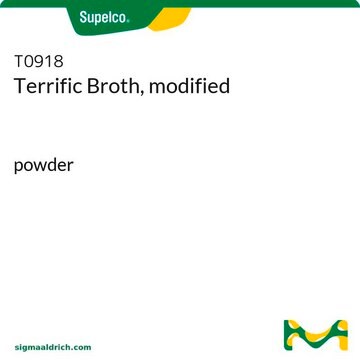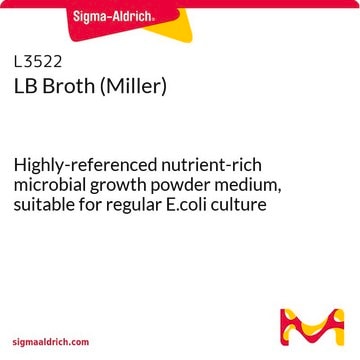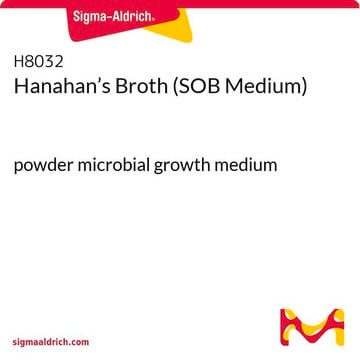Wichtige Dokumente
T9179
Terrific-Bouillon
EZMix powder microbial growth medium
Synonym(e):
TB media
About This Item
Empfohlene Produkte
Qualität
for molecular biology
Qualitätsniveau
Beschreibung
TB; quick dissolve, dust-free formulation
Sterilität
non-sterile
Form
powder
Methode(n)
microbiological culture: suitable
Anwendung(en)
agriculture
food and beverages
microbiology
Lagertemp.
room temp
Eignung
nonselective for Escherichia coli
nonselective for coliforms
Allgemeine Beschreibung
Anwendung
Terrific Broth wird eingesetzt:
- als Medium für das selektive Wachstum von E.coli BL21 (DE3) V2RpRARE, das eine MLL SET (nukleäres Protoonkogen)-Domäne in pET28GST-LIC exprimiert
- zur Kultivierung von BL21(DE3)-Zellen, die Plasmid enthalten, das IL-8 (Interleukin-8) exprimiert
- Terrific Broth ist auch geeignet zur Verwendung in Bakteriensuspensionen (Bacillus subtilis-Stamm 1085B)
Leistungsmerkmale und Vorteile
- Granuliertes, staubfreies Format für sicherere Handhabung und schnelleres Mischen
- Kostengünstige Alternative zu Flüssigkeit
- Modifizierte Formulierung (ohne Glycerin)
- Einfaches Hochskalieren durch Verwenden größerer Packungen
Komponenten
23,6 g/L Hefeextrakt
11,8 g/L Trypton
9,4 g/L K2HPO4
2,2 g/L KH2PO4
Rekonstituierung
Rechtliche Hinweise
Ähnliches Produkt
Lagerklassenschlüssel
11 - Combustible Solids
WGK
WGK 3
Flammpunkt (°F)
Not applicable
Flammpunkt (°C)
Not applicable
Analysenzertifikate (COA)
Suchen Sie nach Analysenzertifikate (COA), indem Sie die Lot-/Chargennummer des Produkts eingeben. Lot- und Chargennummern sind auf dem Produktetikett hinter den Wörtern ‘Lot’ oder ‘Batch’ (Lot oder Charge) zu finden.
Besitzen Sie dieses Produkt bereits?
In der Dokumentenbibliothek finden Sie die Dokumentation zu den Produkten, die Sie kürzlich erworben haben.
Kunden haben sich ebenfalls angesehen
Unser Team von Wissenschaftlern verfügt über Erfahrung in allen Forschungsbereichen einschließlich Life Science, Materialwissenschaften, chemischer Synthese, Chromatographie, Analytik und vielen mehr..
Setzen Sie sich mit dem technischen Dienst in Verbindung.












